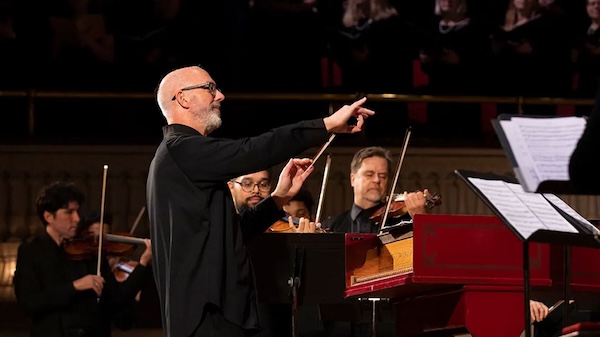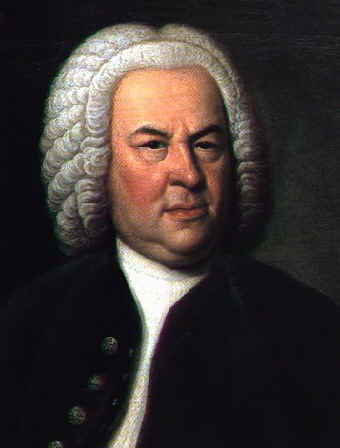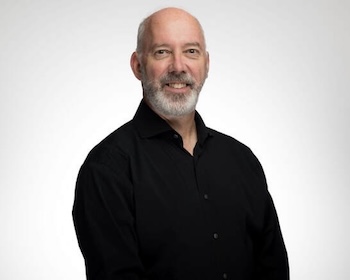Classical Concert Preview: Music Worcester’s The Complete Bach
By Jonathan Blumhofer
“The more you listen to Bach, the more the synapses fire and you just have to take hold of the reins and let the Bach horse take you wherever it will.”

Chris Shepard, the artistic director and conductor of the Worcester Chorus, will be leading the Complete Bach Project under the auspices of Music Worcester. Photo: Matt Wright
The Complete Bach, Music Worcester’s 11-year-long survey of all the music of Johann Sebastian Bach, officially kicks off on October 25th. In anticipation of the occasion, I spoke with one of the prime movers behind the undertaking, Worcester Chorus music director Chris Shepard, whose experience with this fare is as immense as his enthusiasm for sharing it far and wide. Among many other things, he wanted to draw attention to the engaging series of podcasts available on the project’s website that offer background and insights on the composer, his music, and his reception.
Below is a transcript of our larger conversation, edited for length, clarity, and content.
Arts Fuse: So, first off, how did this project come about?
Chris Shepard: Well, for years [Music Worcester executive director Adrien Finlay] has been saying let’s figure out a way for you to get to do the complete cantatas, and we talked about it again in January a year ago. And as I started thinking about all that goes on with Bach in Boston and what Emmanuel [Music] has done, and there are now a number of people around the world who have done all the cantatas — or are doing them — I said to Adrien, “Actually, as crazy as this sounds, I think that ship has left dock and if we really want to differentiate ourselves, I think we should do everything.” And he just saw the possibility of that immediately.
AF: Though it’s a lot of music — 132 concerts over 11 years — it’s not quite so daunting an undertaking as it might seem since, in addition to having the Worcester Chorus as a sort of in-house ensemble, Music Worcester is an active presenting organization. How does that play into the programming this year and in coming seasons?

Johann Sebastian Bach. Photo: Wiki Common
CS: Right! The Chorus is, in some senses, the vestigial arm of a bigger organization that went in a different direction. So, as you know, Music Worcester brings in some really varied programs every year, some very big names, some up-and-coming artists. You hear everything that any good presenter does. But at the same time, we have this chorus that is very much a part of the picture, too. And we just kind of landed on, “Oh wow, this is the perfect way to combine the two things.” So the Chorus will be involved, but it’s not at all the only participant in the project.
In fact, all our usuals will be taking a hand: it’s the people that we know and love. For example, this year Jeremy Denk, Zlatomir Fung, and Simone Dinnerstein are coming. Vijay Gupta, who was with us last year, will be coming back. I can’t give you names because we’re still in the planning stages, but I can give you a tease that it is extraordinary how many artists and artist’s managers have already been reaching out to us. It is clear that the musical world knows about this project already, which is so exciting!
AF: And, in addition to established names, there are some ad hoc groups involved, as well, right?
CS: Correct. I’m much more about gathering community to do things now than when I was younger. And this whole project is very much a community effort, so we’ve formed something called the Worcester Bach Collective, which is church choirs, community choirs, children’s choirs — you name it — so that everybody can have a chance, because I just believe so strongly that Bach’s music is for everybody.
AF: Do you feel that’s something that’s been lost or is felt/understood less now than it should be?
CS: Something happened with the period instrument revolution that was so phenomenal because it just furthered our understanding of Bach’s music so much. But the flip side of the challenge for many, many years was that you could not, as an amateur large choir, perform Bach without getting absolutely smacked by the critics. So people just stopped doing it. And I think that’s really a shame.
I do think that there are works that are so difficult for choir, often because he wrote them for professional choir. And that’s why CONCORA, my professional choir from Connecticut, is involved in some of these performances. But there are so many pieces that avocational singers can do. Sure, they might be scared at the beginning but, by the end, they’re like, “Oh yeah, this isn’t as hard as it seems.”
AF: And, from what I hear, it’s not just limited to local groups and musicians.
CS: Exactly. This has always been conceived as a project that is like throwing a stone into the water. So, yes, the first circle around that stone is Worcester. But, very quickly, I’m hearing from my colleagues who want to bring their choirs from throughout New England. We were in Barcelona this summer — I was conducting Bach at a festival there – and we already have set up in two years a “Barcelona takeover” for one of our weekends where they’ll bring this professional group that does cantatas every year but also, you know, an avocational choir.
Ultimately, I want [The Complete Bach] to belong to everybody in the audience and on the stage and that’s why we’re finishing this month’s performances the way we are [with a performance by the Collective]. I just love doing these things where singers come from far and wide. I think it’s a little bit like throwing a party and you think, “Oh gosh, I hope that people will come.” So you make sure that that you invite some close friends so that you won’t be alone when the party starts.
For this, I thought that we might get sixty people at the most and we have nearly 150 people from as far away as Florida. So it’s really exciting. That weekend is shaping up as a proper festival and, from the beginning, will have this real hive of activity surrounding all of it.
AF: Which is what Music Worcester really used to be…
CS: Yes! It really hearkens back to the roots, 160 years ago, of the Worcester Music Festival, where you’d have these enormous choirs of 300 and people would come from out of town for the week. And I just think it’s really kind of cool that, in this sense, Adrien and I are returning part of what music here was to the very beginning.
AF: This season there are two big weekends of concerts – BACHtoberfest (October 25-27) and the Bach Birthday Bash (March 21-23) – as well as events sprinkled through the rest of the year. Will that be the scheme going forwards?

Conductor Chris Shepard. Photo: courtesy of the artist
CS: Basically, yes. Serendipitously, Mechanics Hall, which we all love, has been incredible in working with us. What we figured out is that if we do two weekends a year — the last weekend of October and the weekend closest to Bach’s birthday on March 21st — then we can knock off at least seven out of twelve annual concerts. So Mechanics has blocked those two weekends every year.
AF: All of this Bach, though, doesn’t constitute the whole season of either the Worcester Chorus or Music Worcester, right?
CS: Not at all. You know, I am very aware that there are people who love singing Bach. There are people who like singing Bach. And there are people who tolerate singing Bach. And I know that not everybody joined the Worcester Chorus to sing Bach all the time – and, really, the same thing is true of our audience. [Music Worcester does] twenty to twenty-four concerts a year, so there’s plenty of other stuff being offered.
Having said that, we also eventually want to have some Bach jazz events, Bach dance events — something that connects every part of our audience so that they can have something to relate to.
AF: Though Bach can seem like a rather formidable musical figure, as you said, he’s “for everyone.” How does one get around the challenges — of style, syntax, complexity, sometimes length — that his music presents?
CS: Well, I don’t want to apologize for the music of Johann Sebastian Bach and I don’t doubt the ability of our audiences to love this music. I don’t think it needs to be watered down and I don’t think that we ever need to talk down to people about it. But, yes, it is a challenge on some level to sit and listen to all six Cello Suites in one concert, as we will do in October with Zlatomir Fung. Or to hear all six Partitas, as we will to with Jeremy Denk in March. But I just really believe that the challenge is part of the glory of the music. And the more you listen to Bach, the more the synapses fire and you just have to take hold of the reins and let the Bach horse take you wherever it will.
AF: You mentioned earlier some of the places that are closely associated with Bach performance – Boston, the Netherlands, Leipzig. How do you see Worcester fitting in on that list?
CS: Well, Worcester is a city that I’ve really fallen in love with. I’ve been working there now for fifteen years and I think that the renaissance that the city has experienced over the last five years or so is only a glimpse of its trajectory. It’s a community that’s burgeoning now but also, historically, it’s a community that rallies for things. It’s extremely civic-minded and part of the evidence of that is that these old family foundations that exist in Worcester support the arts and other activities at a level that is matched only in the great cities of the world. It just makes things possible and they want to provide opportunities for the people who live in Worcester. I just love that am so very grateful for all it enables us to do.
BACHtoberfest opens with CONCORA performing the cantatas BWV 71, 119, and 120 at 8 p.m. on Friday. On Saturday, Peter Edwin Krasinski gives an organ recital at 4 p.m. and Zlatomir Fung plays the six Cello Suites at 7 p.m. Sunday’s events feature the BACHtoberfest Choir and Worcester Children’s Chorus in the cantatas BWV 62, 122, and 50. All performances are at Mechanics Hall. Also, the First Unitarian Church Choir presents the cantata BWV 61 at 10:30 a.m. Sunday at First Unitarian Church, Worcester.
Jonathan Blumhofer is a composer and violist who has been active in the greater Boston area since 2004. His music has received numerous awards and been performed by various ensembles, including the American Composers Orchestra, Kiev Philharmonic, Camerata Chicago, Xanthos Ensemble, and Juventas New Music Group. Since receiving his doctorate from Boston University in 2010, Jon has taught at Clark University, Worcester Polytechnic Institute, and online for the University of Phoenix, in addition to writing music criticism for the Worcester Telegram & Gazette.
Tagged: Bach Birthday Bash, Chris Shepard, Johann Sebastian Bach, Music Worcester, The Complete Bach

